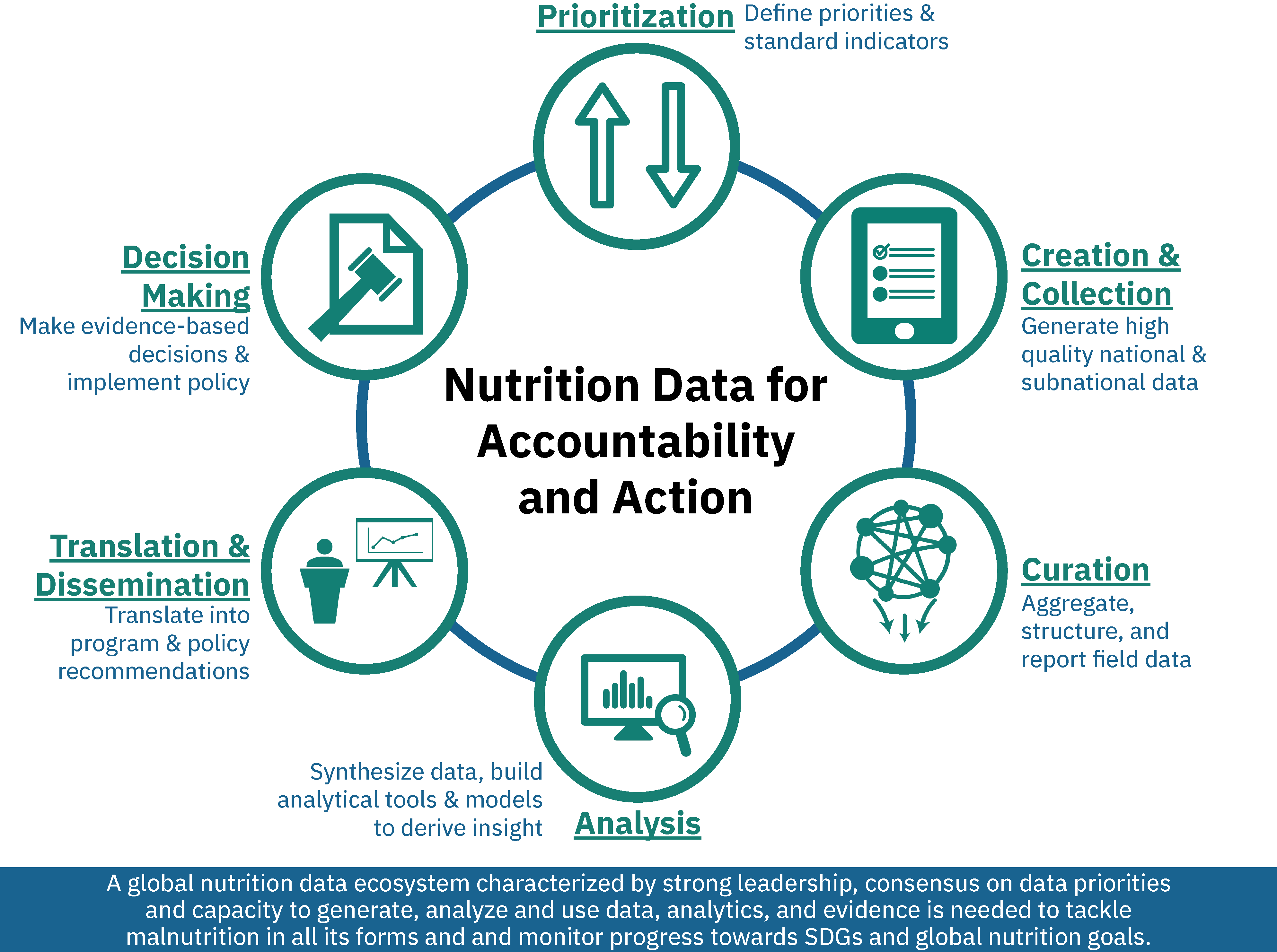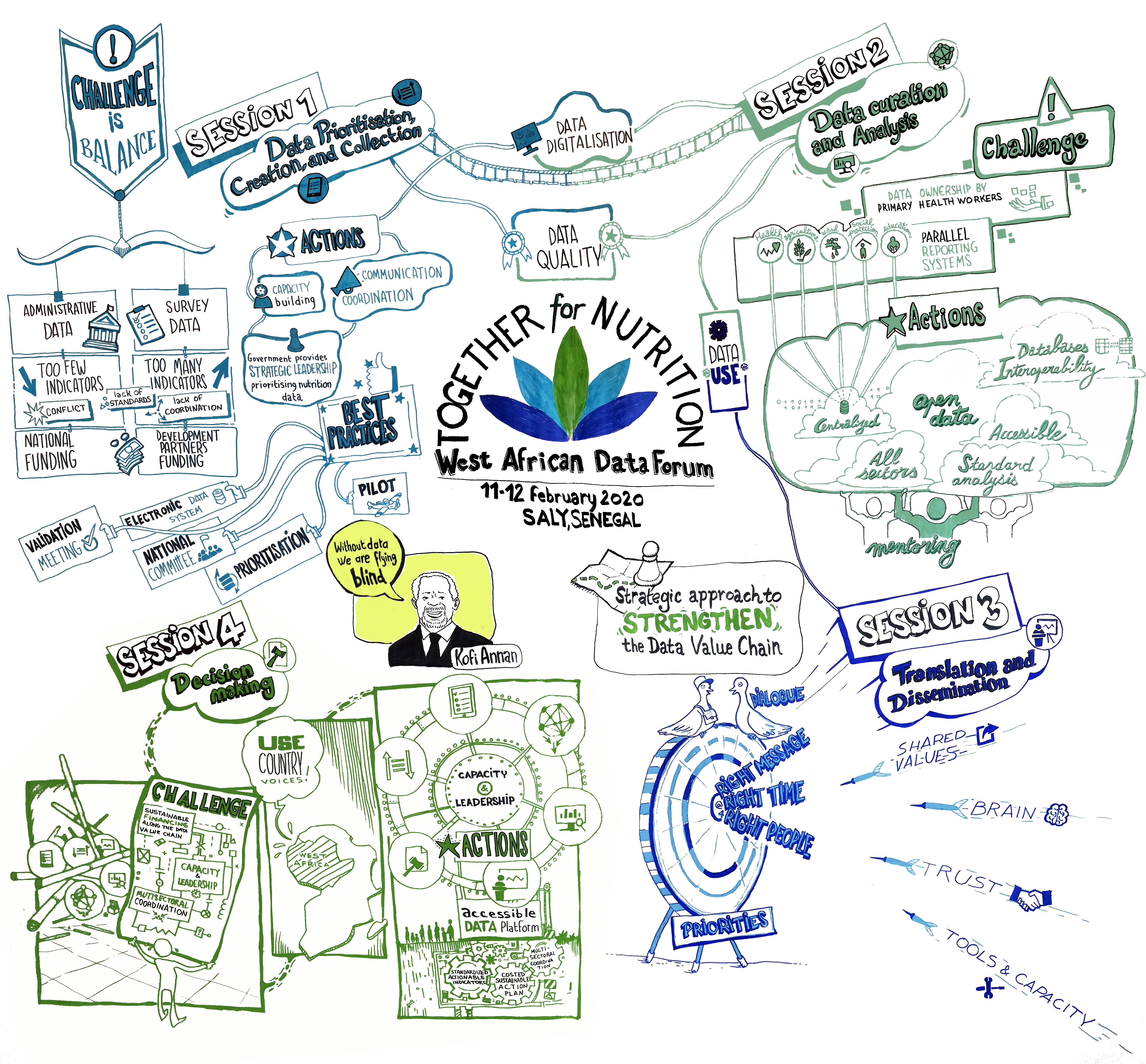Investing in the data value chain for nutrition in West Africa
By Roos Verstraeten
Roos Verstraeten is a research coordinator with the Poverty, Health and Nutrition Division of the International Food Policy Research Institute (IFPRI) in Dakar, Senegal where she coordinates the research and regional knowledge platform, Transform Nutrition West Africa. She has a PhD in Bioscience Engineering and experience working in nutrition research in multiple contexts.
Data and the building of country-level data-related capacity is central to achieving the Sustainable Development Goals by 2030. In 2014, the Global Nutrition Report called for a “Nutrition Data Revolution” (IFPRI, 2014). Various actions, investments and initiatives were subsequently shaped that focus on advancing nutrition data at country, regional and global level (Kim, 2016). These include consensus building on sets of standard indicators (e.g., Global Monitoring Framework on Maternal, Infant and Young Child Nutrition1) and the inclusion of new indicators in demographic and health surveys, the use of innovative analytic modelling tools to prioritise investments in nutrition (e.g., Nutrition Modelling Consortium2) and the synthesis and translation of nutrition data and evidence to inform decision-making for policies, programmes and advocacy (e.g., Transform Nutrition West Africa,3 Data for Decisions to Expand Nutrition Transformation4 and National Information Platforms for Nutrition5). The Nutrition Data Value Chain (Development Initiatives, 2017) introduced a blueprint for a common language and action around data and information systems to ensure that better data and information is used in decisions (Figure 1). It highlights the need for significant investment in capacity throughout the entire data value chain as well as strong leadership and coordination to promote the use of data to inform decision-making at all levels and across nutrition-relevant sectors.
Figure 1: Nutrition data value chain

Despite these investments, gaps remain to fully understand the nature and complexity of malnutrition in all its forms (Development Initiatives, 2018) and challenges exist at each link in the nutrition data value chain. In the face of these gaps, it remains challenging for in-country decision-makers to effectively monitor and track their nutrition priorities. In response, a group of regional and global partners convened the Together for Nutrition: West African Data Forum in Senegal in February 2020. The forum brought together 93 participants6 from key national and regional institutions across 15 countries of the Economic Community of West African States (ECOWAS) that generate and/or use nutrition-related data. The objectives of the forum were to i) share national and regional achievements and challenges in operationalising the data value chain for nutrition, ii) strengthen connectivity, coordination and collaboration on data-driven nutrition action, iii) formulate a call to action to strengthen the data value chain for nutrition at country and regional level and iv) identify stakeholder groups to take up and support the call to action.
Through a mix of plenary and breakout sessions that included panels, discussions, training exercises, networking and visual notetaking, participants took stock of the data value chain for nutrition in West Africa. Country and regional experiences were shared related to each step of the nutrition data value chain by researchers, policymakers, implementers, donors and international agencies. Breakout groups refined the various calls to action, synthesised lessons learnt for each stage of the chain and identified promising practices and the support required for implementation (Figure 2).
Figure 2: Visual summary of sessions

Drawing on these lessons and opportunities, participants developed a common Call To Action (CTA) for strengthening actions across the nutrition data value chain directed to national and regional governments, donors, UN agencies, implementing partners and researchers. This CTA reflects the priorities of individuals and institutions working on nutrition from the 15 ECOWAS countries and has been endorsed by the West African Health Organisation (WAHO). In addition, participants suggested various ways to adapt and use it in their specific contexts. For example, at regional level, the CTA could be adopted during the session of the ECOWAS Assembly of Ministers of Health. At national level, it could be referenced during national policy development to support priorities for action and investment by government agencies and donors.
The Data Forum catalysed uptake by countries such as Liberia which has adapted the CTA to its own context. To accelerate uptake throughout the region, the WAHO organised a webinar that aimed to share some of these experiences with all West African countries (January 2021). This regional-driven approach to put into practice the Nutrition Data Value Chain brings to life a quote from Piwoz et al., “What gets defined gets measured. What gets measured gets done. What gets costed gets financed.” (Piwoz et al., 2019).
The meeting report and all other outputs from the Forum are available on the event page at: https://westafrica.transformnutrition.org/event/together-for-nutrition-west-african-data-forum
For more information, please contact Roos Verstraeten.
Subscribe freely to receive Field Exchange content to your mailbox or front door.
Endnotes
1 https://www.who.int/nutrition/topics/indicators_monitoringframework_miycn_background.pdf?ua=1
2 https://www.nyas.org/programs/nutrition-modeling-consortium/
3 Transform Nutrition West Africa (TNWA): https://westafrica.transformnutrition.org/
4 Data for Decisions to Expand Nutrition Transformation (DataDENT): https://datadent.org/about-us/
5 National Information Platforms for Nutrition (NIPN): http://www.nipn-nutrition-platforms.org/
6 The group was led by Transform Nutrition West Africa, an initiative of the International Food Policy Research Institute (IFPRI) and included the following partners active in the West African region: UNICEF, DataDENT, Countdown to 2030, Alive & Thrive, USAID, WHO, WAHO, and NIPN. https://westafrica.transformnutrition.org/
References
Development Initiatives. (2017). Global Nutrition Report 2017: Nourishing the SDGs. Bristol, UK: Development Initiatives.
Development Initiatives. (2018). Global Nutrition Report 2018: Shining a light to spur action on nutrition. Bristol, UK: Development Initiatives.
IFPRI. (2014). Global Nutrition Report 2014: Actions and Accountability to Accelerate the World’s Progress on Nutrition. The International Food Policy Research Institute. Washington, DC, USA.
Kim D. (2016). Mapping Exercise Global Data and Accountability Initiatives for Nutrition.
Piwoz E, Rawat R, Fracassi P, and Kim D. (2019). Strengthening the Data Value Chain for accountability and Action. Progress, gaps, and next steps. Sight and Life Magazine, Data in Nutrition, Vol. 33(1). https://sightandlife.org/wp-content/uploads/2019/08/SightandLifeMagazine_2019_Data_in_Nutrition_FULL.pdf


